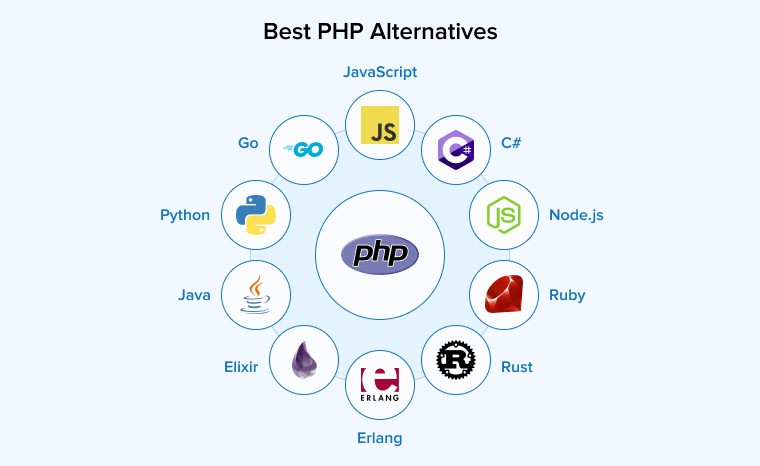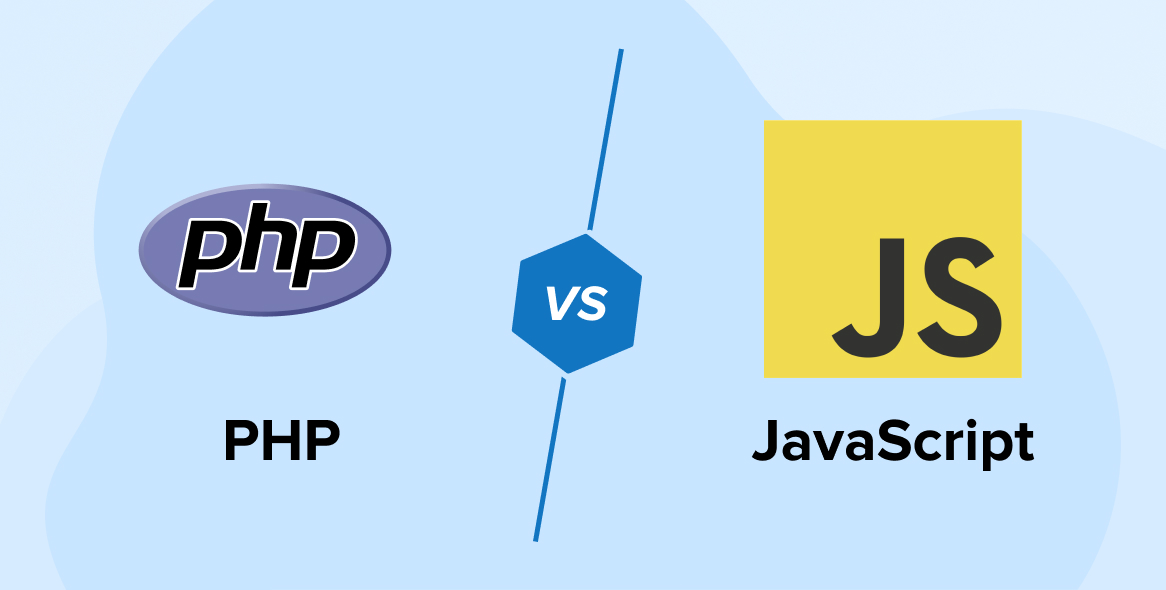
PHP is a popular and preferred choice for web development projects. Surveys from StackOverflow suggest that PHP has been ranked among the top programming languages for the past decade. Its open-source distribution and reasonable performance have certainly made it a widely used language. If you opt for this language, you can easily find a PHP development company that delivers excellent web solutions.
However, if your requirements differ, then PHP is not the right fit as it solely focuses on web development. Moreover, security concerns and limited debugging options are among the many reasons that are driving modern-day developers to move away from PHP.
So, if you’re looking for a better PHP alternative then this article is for you. It discusses the best programming languages that can not only replace PHP but offer more advanced capabilities to help you achieve better results.
1. 10 Best PHP Alternatives

Here, We’ll take a closer look at the top PHP alternatives, that you should take into consideration for any web development scenario. These alternatives provide different advantages that may suit your project requirements.
1.1 Python
Python is one of the most robust alternatives to PHP, it is versatile enough to help you build a large array of solutions ranging from small-scale applications to large-scale apps. The demand for Python is on the rise as it is very useful in building apps based on advanced and emerging technologies like AI, ML, and data science.
It provides seamless integration with various databases to process and handle large sets of data. It enables the developers to create automation scripts and analytic systems. Python is beginner-friendly because it consists of an easy-to-understand syntax which similar to English. Moreover, it also offers numerous built-in functions which reduce the costs and time of development.
Python enjoys a large community support that actively contributes to the advancement. It also has an extensive ecosystem with a large array of frameworks and libraries.
Python Advantages
- Dynamically Typed: Python automatically assigns the data type during code execution. Hence, the programmers don’t need to declare variables and their data types.
- Free and Open-Source: You can use and distribute Python for free. You can download its source code and modify it to fit the requirements of your organization.
- Libraries: Any function you need is available in the standard library of Python. You no longer have to rely on external libraries. But Python still allows you to integrate with third-party libraries if you want.
- Portability: You need to make changes to your code to make it run on different platforms. But you only have to write the Python code once and then you can run it anywhere.
Python Disadvantages
- Slow Speed: The speed of Python is slow as it executes the code line by line due to its dynamically typed nature.
- Not Memory Efficient: Python consumes way too much memory which can be a huge problem for most apps requiring memory optimization.
- Database Access: In terms of database integration, Python does not fare well. It comes with a primitive access layer and is underdeveloped compared to other popular technologies.
- Runtime Errors: Because it is dynamically typed, the variable’s data type in Python can change anytime. A variable containing an integer can then hold a string. This can cause some serious runtime errors.
1.2 Java
According to W3Tech, only 5.0% of websites on the internet use Java but its versatility, scalability, and robustness make it one of the most formidable PHP alternatives. Java is popular for handling heavy workloads and complex apps with high speed and efficiency.

As an object-oriented programmer, Java takes a structured approach to web development. It offers a large range of Java development frameworks, libraries, and tools to help with different aspects of your project. Many companies prefer Java for enterprise-grade software development due to its robustness and scalability.
In addition to that, developers can also leverage Java to create IoT, mobile, and web applications. More importantly, Java follows the philosophy of “write once, run anywhere’. So you only have to write a program only one time and can later run it virtually on any platform you want. In Short, Java allows developers to build cross-platform applications.
Java Advantages
- Simple Syntax: It is easy to learn coding with Java because of its simple syntax. Even though it’s a high level language, Java actually follows some rules from human language, making it easier to build and maintain Java-based apps.
- Object-Oriented Programming (OOP): Thanks to its object-oriented nature, Java promotes the reuse of objects across multiple projects. It also helps with code organization.
- Security: Java comes with its own Security Manager where you can determine your security policies. This allows you to make specific access rules for your application.
- Platform-Independent: Java comes with cross-platform capabilities. Its JVM allows you to write code that can run on different platforms and operating systems.
Java Disadvantages
- GUI Development Challenges: You may face many challenges during GUI development with Java as it is not advanced enough to create complex GUIs.
- Memory space: Java also consumes a considerable amount of memory space. This can have a negative impact on the performance and memory efficiency of the system.
- Code Complexity: Java code consists of too many words. Although it is less complex than C++, Java is indeed more verbose than languages like Python.
1.3 Go
Golang, popularly known as Go is one of the newer programming languages that could potentially replace PHP. Developed and maintained by Google, Go offers efficient features and tools to easily develop highly scalable apps. Having a streamlined syntax with support for parallelism and concurrency, Go helps developers build high-performing distributed apps for corporate networks and cloud-based environments.
The inherent concurrency mechanisms and compiled nature of Go help offer better performance than interpreted languages such as PHP. Go also minimizes runtime errors and ensures compile-time safety, leading to improved maintainability and readability.
Go comes with a robust standard library with support for networking, HTTP support, and encryption. Its comprehensive offerings help reduce the need for third-party dependencies, giving better control over your codebase.
Go Advantages
- Concurrency: Though concurrency can be difficult, it isnt when using Go. it allows you to process all the requests and free resources very quickly.
- Open source: The term Open-source has become synonymous with a large community in the IT sector. When a programming language is open-source, it is easy to find experts that can help you solve development issues related to it. Same goes for Golang.
- Garbage collection: This enables effective memory management. You don’t have to put any effort into it. Golang takes care of it for you.
- Static code analysis: Golang can be easily integrated with any coding environment you want. It takes care of all your coding requirements from style listing to formatting and more.
Go Disadvantages
- No Virtual Machine: The absence of a Virtual Machine means the standalone binaries will be huge. In case you are building a complex app, then this can also cause a RAM consumption problem.
- Time-Consuming: Golang requires a lot of coding to enable functionality compared to programming languages like Python. So, it may take longer to develop an app with Golang.
- Young Language: Compared to other conventional programming languages, Golang is still categorized as a fresh lot. So, its ecosystem isn’t mature yet and has little support for SDKs and libraries.
1.4 JavaScript
Many developers consider JavaScript as the best PHP alternative. It is one of the most popular programming languages used for web, mobile, and desktop development. It is quite flexible and offers cross-platform capability. Many top companies including PayPal, Netflix, and Uber use it.
In JavaScript, functions are really flexible & interesting.
— freeCodeCamp.org (@freeCodeCamp) April 7, 2024
You can assign them as a value to a variable, pass them as an argument to another function, etc.
In this guide, @developeraspire teaches you how callbacks and higher order functions work in JS.https://t.co/MlyVuyOKwO
JavaScript is a versatile language used for both front-end and server-side development. It also allows you to create visually appealing graphics and automated elements for your apps or websites. Building different kinds of dynamic products is possible with JavaScript.
JavaScript is ideal for building real-time applications as it can manage multiple concurrent requests efficiently. It also enables non-blocking operations due to its asynchronous nature, resulting in enhanced performance. The simple syntax of JavaScript helps speed up the development process.
Additionally, JavaScript offers resources in abundance as it is supported by a large community of developers. They actively help in resolving development issues.
JavaScript Advantages
- Interoperability: Even if different programmers or teams write different parts of JS code, they can still be used together without any hassle. It helps manage browser API calls and DOM manipulation.
- Asynchronous Programming: This enables non-blocking operations like retrieving data, managing user input, and handling concurrent processes.
- Rich Ecosystem: JavaScript has one of the most gigantic ecosystems including different frameworks and libraries like Angular, React and Vue. They offer pre-built components that simplify the web development process.
- Enhanced Speed and Efficiency: JavaScript is capable of executing on the client side, reducing its dependency on server resources. This minimizes the loading time and allows dynamic interactions without continuous server communication.
JavaScript Disadvantages
- Single Inheritance: Objects in JavaScript can inherit only one prototype object.
- Issues with Debugging: Because of the loosely typed nature and dynamic behavior of JavaScript, the errors are harder to detect during development. They are visible only during the runtime. Rectifying them then would be quite a hassle.
- SEO Challenges: Search engines find it difficult to understand and index content created by Javascript. So, it would be challenging to discover JavaScript websites through online searches.
1.5 Ruby
Ruby is a popular object-oriented programming language that allows web developers to build websites and applications easily and quickly. It’s easy to use and beginner-friendly as its syntax is more elegant and readable than PHP, which makes it a good PHP alternative.
Ruby also adheres to the “Don’t Repeat Yourself” rule which helps reduce the amount of unnecessary code and accelerates the software development process. Ruby also offers some robust frameworks like Ruby on Rails(RoR) for web development.
RoR is famous for its support of modularity and code reusability, which increases the app efficiency and developer productivity. While there are other Ruby-based frameworks, RoR stands out as the best. With the extended capabilities of RoR, you can also use Ruby as a dynamic language to create dynamic web pages.
Ruby Advantages
- Flexibility: Modifying code is easy in Ruby and you can immediately see the results.
- Beginner-friendly: There isn’t any boilerplate code in Ruby. Also, it adheres to the convention over configuration rule. So, it is easy to use and set up Ruby for development projects.
- Libraries: Ruby offers a wide range of third-party libraries that can help you fulfill your project requirements.
- Security: Ruby when combined with the Rails framework, is dubbed as one of the most secure technologies. It comes with built-in security functionalities and provides protection against the most popular security attacks like CSRF, XSS and SQL injection.
Ruby Disadvantages
- Application runtime: Speed of the Ruby-based apps is a bit slower compared to other technologies. However, this is the case for apps with a large user base. Small apps do not face any issues of speed or performance.
- Improper Documentation: Ruby lacks up-to-date documentations which could be a big problem because most Ruby developers rely on documentation for their development tasks.
- Performance: Ruby is also not a candidate with great performance. Because it lacks speed, its performance also takes a huge hit. You can use a fast interpreter or compiler to make up for that loss.
1.6 C#
Microsoft developed C# programming language to build Windows applications. With support from Microsoft technologies such as .NET, .NET Core, and Xamarin, C# offers a wide range of tools and libraries.
This programming language is user-friendly, intuitive, versatile, logical, and well-designed. It can be implemented in various types of projects including, web, app, mobile, and game development. These qualities are enough to make any programming language popular.
Using an intermediate language, web developers can easily compile the native code of C#, making it faster than PHP. C# consists of a rich ecosystem and offers high performance, which is suitable for developing resource-intensive applications. Maybe that’s why many top tech firms support this object-oriented programming language.
C# puts a great emphasis on security by offering features like memory management, access control, and exception handling. Because it’s a strongly typed language, C# also minimizes runtime errors.
C# Advantages
- Multi-platform Development: Apps based on C# programming languages can run on various platforms like Windows, Linux, and MacOS.
- Strong Typing: In C#Type checking is conducted during compilation which helps reduce the chances of runtime errors and enhances the code readability.
- Garbage Collection: This feature of C# enables automatic memory management helping developers avoid memory leaks.
- Asynchronous Programming: This makes building responsive and scalable apps in C# easy.
C# Disadvantages
- Windows Dependency: The multiplatform capabilities of C# are due to its integration with .NET Core. Otherwise, the working of the language is limited to the Windows ecosystem.
- Performance: The efficiency of C# is low compared to other low-level languages like C and C++. You can’t use it to create high-performance apps.
- Learning Curve: The learning curve for C# is higher compared to other languages like JavaScript and Python.
1.7 Elixir
Built on the Erlang Virtual Machine, Elixir is a dynamic language with a functional programming style. This functional programming paradigm encourages developers to write clear and concise code.
This language is easy to adopt as it comes with a clean syntax. Developers can use it for various kinds of projects including IoT and Blockchain. Elixir supports concurrency that allows your apps to manage multiple requests simultaneously.
Additionally, Elixir has also inherited the fault-tolerant nature of Erlang. This means that your Elixir-based apps would stay functional even in the face of errors and failures. This is very helpful in building powerful apps.
Elixir Advantages
- Fault tolerance: In terms of error resistance, Elixir is one of the most robust programming languages. Elixir supervisors guide you through the recovery. It also allows you to create supervision which helps enhance app performance and fault tolerance.
- Extensive documentation: The documentation in Elixir is very detailed and information with answers to any question a developer might have for their projects.
- Speed: Elixir has proven to be faster and high-performing than languages like Ruby. This helps deliver a responsive app and a great user experience.
- Reliability: Thanks to its extensive features and functionalities, Elixir is dubbed as one of the strongest and most reliable programming languages.
Elixir Disadvantages
- Immature ecosystem: Elixir is not a perfect programming language. It lacks library support. So, developers either have to build their own components or bring their own libraries.
- Functional programming: Programming is a little difficult in Elixir especially if you are an experienced developer. Because Elixir doesn’t support object-oriented programming, which is a feature of all the conventional languages.
- Small talent pool: Being one of the latest programming languages, the market for Elixir hasn’t grown yet. So, you won’t find many Elixir developers in the market.
1.8 Node.js
Node.js isn’t technically a programming language, but a server-side run-time development environment for JavaScript. This means it allows web developers to use JS for server-side development, enabling the creation of scalable and high-performing applications.
high-performance, scalable web applications. Node.js allows developers to write server-side code in JavaScript, facilitating the development of applications with shared code between the client and server sides. Key features of Node.js include asynchronous I/O, an event-driven
— ProxySale (@proxysalecom) April 8, 2024
But that’s not all NodeJS can do. It is lightweight and comes with various robust features including NPM, literally the largest ecosystem of open-source libraries in the world. Its event-driven architecture allows you to handle multiple connections efficiently, ensuring high throughput. It helps build faster data streaming and real-time apps.
NodeJS also allows you to run asynchronous code on the server to boost its performance and its ability to handle more requests concurrently. It also promotes code reusability by providing a single language to work across and allows seamless interactions between client-side and server-side apps.
Node.js Advantages
- Fast delivery: NodeJS offers both client-side and server-side in JavaScript. This reduces the number of files and code required.it also promotes code reuse in the frontend and backend of your app, resulting in faster time-to-market.
- Used as a Single Programming Language: Developers can write both client-side and server-side apps with this single runtime environment.
- Handles Requests Simultaneously: With its non-blocking I/O systems, NodeJS allows you to process multiple requests concurrently. This improves the efficiency of your application.
- Easy to learn: If a developer is familiar with the JavaScript programming language, then learning how to use NodeJS would be a piece of cake.
Node.js Disadvantages
- Not ideal for CPU-intensive tasks: Although NodeJS is quite adept at handling I/O bound operations, it certainly can’t handle CPU-intensive tasks.
- Unstable APIs: The APIs in NodeJS are changed frequently. As a result, the developers have to continuously change their code to match the compatibility of the new APIs.
- Offers limited standard library: The standard library of NodeJS is relatively small compared to other server-side technologies. That is why it has to rely on the NPM registry. Dependency on third-party packages comes with its own security risks.
1.9 Rust
Mozilla created a systems programming language called Rust for speed and security. It can work as one of the best PHP alternatives as it offers high performance and low-level control. Rust is popularly used to enhance the performance of low-level languages like C and C++. So, if you are thinking about building a high-performance web app then Rust might be a good option.
To keep the promise of safety, Rust follows the ownership model that prevents common bugs like null pointer dereferencing and data races. Its type system is also helpful in reducing runtime errors. Compiling the Rust code is also easy as it also supports web assembly.
Although its ecosystem isn’t yet developed enough to rival PHP’s. Nevertheless, it’s growing steadily to become viable for various web projects. You can build both server-side and client-side web apps. Whether it’s about developing robust or secure web apps or managing concurrent operations, Rust proves to be a worthy choice.
Rust Advantages
- Memory safety: With Rust, you no longer have to worry about memory management. This also helps avoid buffer overflows and null pointer dereferences, ensuring the security of your application.
- Low overhead: Rust is resource-efficient and can identify errors early on in the development process. This ensures a low overhead and the delivery of an error-free code.
- Better Code Execution: Rust is an ideal language for developers who are working with a requirement for protected and stable execution conditions. It also enables the developers to write the code in a way that it feels like a low-level and elevated-level language at the same time.
- Embedded systems: Rust is a suitable option for embedded systems. This helps handle low-level functionalities and deliver high efficiency. Rust is useful for projects with resource-constrained environments.
Rust Disadvantages
- Slow compilation time: Because it is concerned with safety, Rust takes its time to compile the code. The compilers analyze the code, determine the types, and offer optimization. All of these tend to slow down the compilation process especially if you are working with a large codebase.
- Lacks standard database integration: Unlike other popular languages, Rust does come with a standard method for integrating with databases. It uses database drivers instead but that too isn’t a simple undertaking.
- Complexity: Rust is more complicated than other programming languages, resulting in a higher learning curve. You need better programming skills to efficiently use Rust.
1.10 Erlang
Erlang, which is a functional programming language, serves a different domain than PHP, which is a server-side scripting language. Erlang is popular for its fault tolerance, scalability, and concurrency. It was created specifically to build distributed and concurrent systems.
You can manage numerous tasks simultaneously using Erlang as it offers built-in features like message passing and lightweight processing. Apps built with Erlang are known for their fault-tolerant architecture. This helps systems to recover automatically and function seamlessly even in case of issues or failures occur.
You can also craft applications with horizontal scalability using Erlang as it enables you to add nodes and serves effortlessly. Still, if you wish to replace PHP with Erlang, prepare to face some serious challenges along the way as both languages work in different domains.
Erlang Advantages
- Managing Concurrency & Failure: You can easily create, scale, and distribute concurrent programs with Erlang. Even if a program fails, it automatically re-spawns. It’s the default way of building apps with Erlang’s standard library.
- Scalability and Efficient Resource Utilization: Erlang utilizes the resources efficiently. It can not just manage a large number of concurrent requests but can also scale well in a distributed environment.
- Hot Code Upgrades: Erlang offers seamless code updates without any interruptions or downtime. This allows you to update the app while it’s running, ensuring app availability.
- Lightweight Processes: the processes in Erlang are very lightweight and that is why it is able to support a high level of concurrency. You can run millions of processes concurrently on a single machine without any overhead.
Erlang Disadvantages
- Interoperability Challenges: it’s difficult to integrate Erlang code with other languages’ libraries and systems. It is interoperable with C and C++ but you have to write additional code or use foreign function interfaces to support systems or libraries from other languages.
- Performance Limitations: Although Erlang excels in concurrency and real-time processing. It does not perform well in computational tasks.
- Learning Curve: There is a learning curve with Erlang because of its syntax and programming model. If you aren’t familiar with the actor model or functional programming. It will take a while to learn to use Erlang. Understanding various concepts of Erlang is also time-consuming.
2. Why Look For a PHP Alternative?
Even though around 80% of websites on the internet are powered by PHP, you can opt for other programming languages to use in your web development projects.

There are several of reasons why you should look for PHP alternatives for your web development projects.
2.1 Specialized Use Cases
Every programming language has its available in the market and comes with unique capabilities, making it more and hence better suited for specific industries, projects, and use cases. For instance, a programming language with high concurrency is suitable for developing real-time applications.
2.2 Slow Performance
Although many developers claim that PHP offers out-of-the-box performance right from the start, many also complain about its slow execution speed. Because PHP is an interpreted language and not a compiled one, it executes the code line-by-line. This results in slower performance and speed.
2.3 Multi-Stack Capabilities
In this rapidly growing digital era, developers need to use multiple technologies to develop high-end solutions. Nowadays, there isn’t any single programming language that can fulfill the complex requirements of the changing markets. Hence, it is expected for developers to master multiple technologies. This not only helps them boost their career path but also leads to the delivery of better solutions.
2.4 Diverse Functionalities
PHP alternatives surely offer a diverse set of features and functionalities. They can offer great scalability, performance, and better computing power at the same time. Adopting them would help developers fulfill their project requirements and throw in some additional functionalities, resulting in more to deliver an overall efficient product.
2.5 Lack of Clear Philosophy
PHP doesn’t mandate any clear approach to coding, allowing developers to avoid defining variable types. However this allows PHP developers to be creative and flexible, but it could also lead them to multiple errors resulting in problems with app security and performance.
3. Conclusion
There are many languages and frameworks available in the market for web development. While PHP remains a reliable option, web developers keep an eye out for alternatives that help them cope with the continuously changing and evolving arena of web development. Therefore, it becomes necessary to learn about the best PHP alternatives and understand their pros and cons. It helps you make an informed decision.
In this digital era when the requirements and problems of the customers grow complex. To address these demands, it’s important to use multiple frameworks and programming languages that can harness the potential of emerging technologies and deliver better solutions.
FAQs
What is the best alternative to PHP?
Some of the best alternatives to PHP include programming languages like Python, Java, JavaScript, Go, Ruby, and C#.
Which language will replace PHP?
Many developers believe that the JavaScript programming language will replace PHP. It not only offers some robust web development frameworks but also helps build mobile and desktop applications.
Is PHP becoming outdated?
PHP is one of the oldest and most reliable programming languages. It is already empowering most of the websites on the internet. However, modern languages are better suited to adapt to the latest technological trends and fulfill complex customer requirements.






Comments
Leave a message...